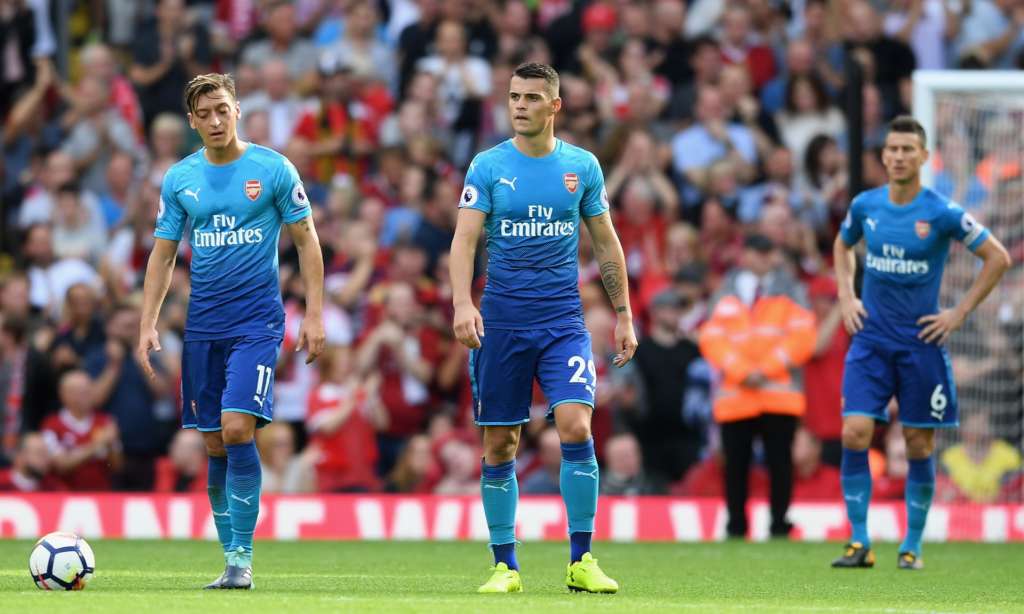In the thick of Arsenal’s chronic breakdown at Anfield on Sunday it did not take long for football’s splurging social commentary to begin establishing just how bad this was compared with other abhorrences. How rotten exactly are things in the state of Arsenal? As bad as the 8-2 at Manchester United? On a par with the season they were dismembered by vicious scorelines at Liverpool, Manchester City and Chelsea? Worse than an aggregate 10-2 thumping from Bayern Munich? More embarrassing than imploding in fright at home to Swansea or Watford or Aston Villa?
Hereby hangs Arsenal’s sharpest problem. Scanning through the past five years to pick out the performances that were especially awful is instructive. This is not an exercise in recalling the common or garden soft defeats at Stoke or West Brom, but a search for the goriest of horror shows. This involves the type of ordeal to leave observers wondering how much longer, how much worse, how much more intolerable, how many times it is possible to repeat the same mistakes without wanting to smash the place up and sweep everything out to start afresh.
This was a subjective exercise but a rough count tots up 20 such occasions over five years. That tells of a damning sense of paralysis, a club constructed in such a way they cannot change the record no matter how screechingly discordant their most annoying songs sound. If Arsenal turn on their internal radio and hear a tune they loathe which taunts them by infernal repetition, they just do not have it in them to change the station. Think about it: 20 times in five years with no radical reaction.
Arsenal have managed to respond to setbacks in their own way. They usually regain enough composure to qualify for the Champions League (missing out only once, last May) and to have earned the sweet salve of three FA Cup victories out of four attempts. But real, profound change, the kind to reset the club as one with ambition to believe in, the kind that creates a team resolve that does not look as if it is made of straw ready to be obliterated by a mere puff of wolfish intent from any opponent, remains a long shot.
The greatest concern to those who care about Arsenal is the fact that getting lacerated by Liverpool with a reasonably strong if weirdly imbalanced selection does not necessarily represent depths significantly lower than other nadirs they have skulked around in the past. If the club did not feel the necessity to address serious issues at any of the previous 19 calamities, why suddenly feel pushed to do things differently after No20?
Which introduces the other major problem. For a long time Arsène Wenger has been a lightning rod for the issues that dog the club. What Arsenal did or did not do in terms of management alone started off as an elephant in the room. But now there is an entire herd of them. One can hardly see the wall on the other side for doleful elephants, great big creatures squishing all their complaints against each other. They have become noisy, too, which is understandable.
The difficulties are manifold. At the top of the business the majority shareholder, Stan Kroenke, has never shown any inclination to take active control of goings-on. The chief executive, Ivan Gazidis, who called for a “catalyst for change” a few months ago, is unable or unwilling to challenge the status quo. The manager presides over a set of players who play as if they either do not know what they are supposed to be doing, cannot do what they are asked to do or do not wish to – a mere three games into the season. To be too tactically sunk and low in determination to perform basic tasks is a desperate recurring theme. Quite what was going on inside the heads of Alexandre Lacazette or Sead Kolasinac as they watched from the bench is hard to fathom. Quite how Jens Lehmann kept any kind of calm counsel is harder still.
Behind the scenes the scouting department and the men detailed with arranging contracts and dealing in the transfer market are failing. Numerous players are out of contract this summer or next and it has not gone unnoticed that recent purchases recommended by the StatDNA data business Arsenal bought supposedly to give them a competitive edge have struggled and are among those Wenger seeks to offload. Elsewhere the marketing and commercial gurus strain to strike deals that compare well with their rivals.
It is not as if this kind of situation was freakish. A flaky run exposing basic problems in the team’s structure and motivation was not exactly unpredictable. Perhaps the shock for Arsenal is how quickly it manifested itself this season.
Can they enforce the changes needed to turn a club that looks unhealthy into one that is radiant and positive? It will not be easy, simply because there appear to be so many departments that are underperforming, complacent, overwhelmed (or any combination of). The probability of any substantial remodelling is wafer thin. There is no reason to believe a change of management, ownership, chief executive or a wholesale shake-up of team personnel or dynamic is around the corner.
The herd of elephants have nowhere obvious to go.
(The Guardian)
